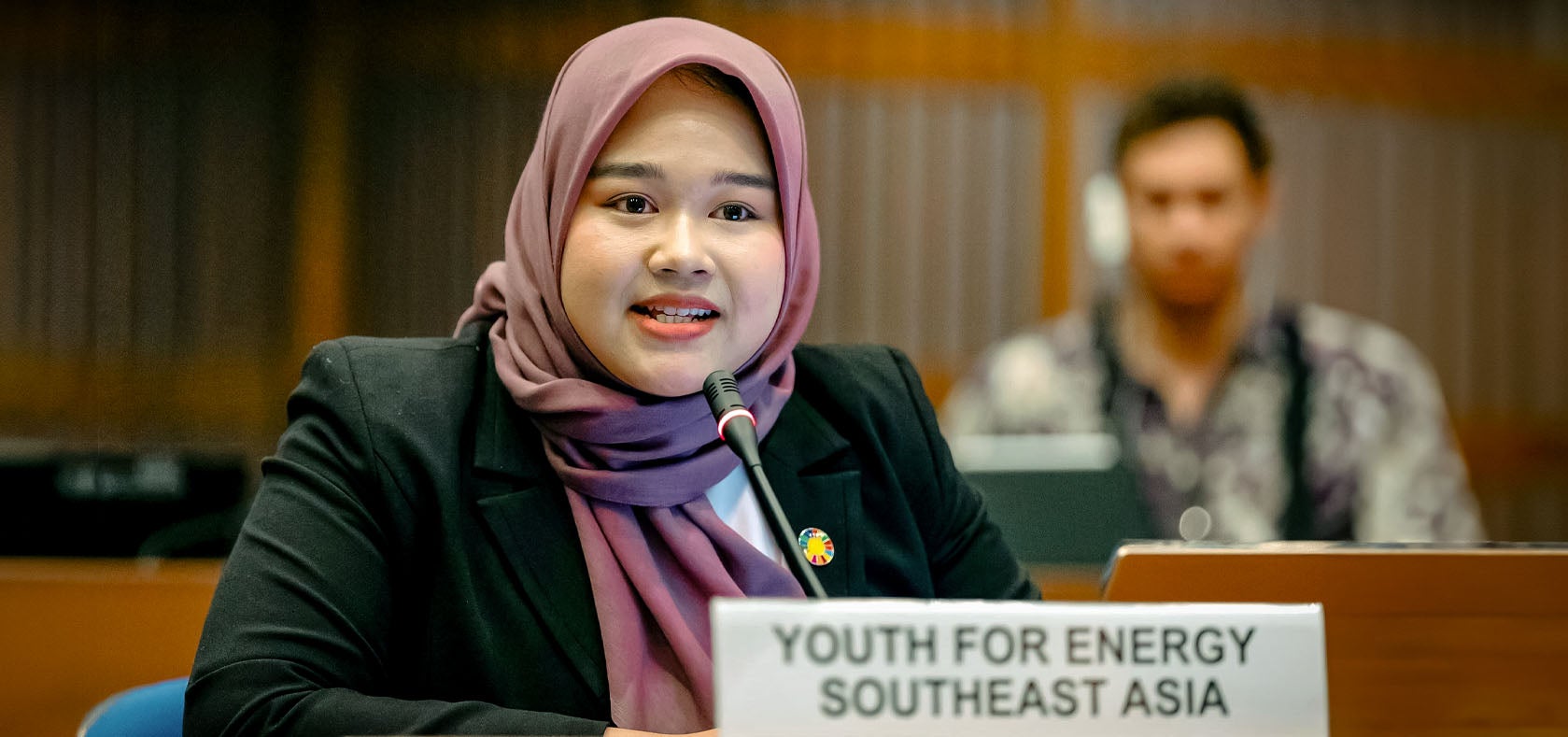In the words of Amira Bilqis: “We need to break the stigma that youth don’t know what they are talking about. Governments should provide pathways for young people to engage in energy and climate action.”
Date:

Amira Bilqis joined the ASEAN Centre for Energy (ACE) in 2020, currently in the position of Energy Modelling and Policy Planning Analyst. She is also the co-founder of Youth for Energy Southeast Asia (Y4E-SEA), a network for young people in Southeast Asia who want to learn about or work on the energy transition. After her daytime job at ACE, she often spends time engaging in youth capacity building and advocacy through Y4E-SEA. Through her work on energy, she aims to drive women’s economic empowerment and a just transition by advancing gender-responsive energy policy in ASEAN.

When I started vocational school at 15, my options felt limited to becoming a secretary because of the gender bias in the energy sector. This was very frustrating because I had invested myself in STEM.
Around that time, my area was experiencing floods, and I realized that I wanted to do something about my environment. Working in the energy sector seemed tangible within the vast area of climate action, somewhere to make an impact. Eventually, I got a job with ACE as they were looking for someone with expertise in social sciences.
I was one of the lucky people who went into higher education, having been accepted to Indonesia’s top law school – even though my previous experience consisted of climbing up towers to fix cables. Most of my friends at vocational school started working directly out of school. With the ongoing energy transition, this limited their potential and professional career. They started jobs that are becoming increasingly irrelevant, and they do not receive reskilling.
As a youth activist in the energy sector, I faced challenges due to my gender and age. The sector is dominated by men and older generations who do not always take youth perspectives seriously. We need to break the stigma that youth do not know what they are talking about. Governments should provide pathways for young people to engage in energy and climate action.
Since the energy transition is happening, why not make other changes when we have the chance to reshape things? Not only technology and investments but also how we think about inclusivity.
I started as a youth activist in energy around the time I started working for ACE in 2021. Initially, I kept my ideas to myself. Leading an organization in a male-dominated industry seemed so scary to me at the time. Then, in 2022, I met Jitsai Santaputra, my co-founder of Youth for Energy Southeast Asia (Y4E-SEA) from Thailand in Malaysia. When I opened up to her, I realized we had the same concerns. We kept in touch and eventually made our idea come true.
Y4E-SEA was launched during the ASEAN Youth Economic Forum in Jakarta. Since then, our organization has been getting a lot of attention, and we see that many people share our vision. We are the first youth organization in Southeast Asia that pledged to the UN Energy Compact as a High Impact Initiative at COP28; we have trained over 100 youth from the region on renewable energy dissemination and regularly appear at regional fora to advocate for meaningful youth engagement We want to debunk the idea that youth organizations only hang out – we can have a meaningful impact.
These, along with the work with the EmPower Programme Team, are some of my proudest achievements. When we launched the ASEAN Renewable Energy (RE) - Gender Roadmap, I felt proud to make a change in Indonesia and across the region. My job allows me to raise awareness on social issues within ASEAN energy policy, bringing that nuance.
In law school, I promised myself to make a change, so now I am doing that in my own capacity by convincing skeptics. If I could tell my 15-year-old self one thing, it would be this: there’s someone out there who will help you achieve your dreams, even in male-dominated sectors. Looking back, it feels like sweet revenge.
Women are driving change, not only in the energy sector, and they can play a key role when it comes to renewable energy, low carbon and net zero.
And if you believe in something, share it with someone. Women may feel shy about speaking up, but when you express yourself, you may find it resonates with other people. I experienced this firsthand with Jitsai, and if I had not talked to her, we would have never mobilized thousands of people in the region. So, be passionate about what you do and articulate your vision clearly so that people can understand. Because you will not make change by yourself.”
In her role as an Energy Modelling and Policy Planning Analyst with ACE, Amira Bilqis and her team have been collaborating with the UN Environment Programme and UN Women. This partnership contributes to the EmPower: Women for Climate-Resilient Societies Programme, which aims to enhance the leadership and participation of women and other marginalized communities in climate resilience efforts across Asia and the Pacific.
For more information, please visit www.empowerforclimate.org or contact:
Maria Holtsberg
Humanitarian Action, Disaster Risk Reduction, Climate Portfolio Lead
UN Women Regional Office for Asia and the Pacific
e: [ Click to reveal ]
Parimita Mohanty
Programme Management Officer, Climate Change Division
UNEP Regional Office for Asia and the Pacific
e: [ Click to reveal ]